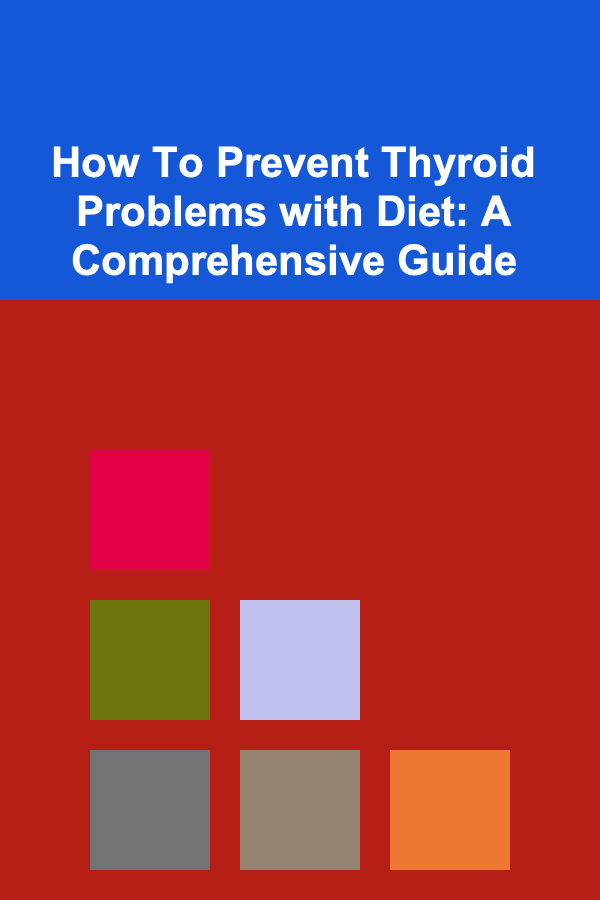
How To Prevent Thyroid Problems with Diet: A Comprehensive Guide
ebook include PDF & Audio bundle (Micro Guide)
$12.99$7.99
Limited Time Offer! Order within the next:

The thyroid gland, a small butterfly-shaped organ located at the base of your neck, plays a crucial role in regulating metabolism, growth, and development. Thyroid disorders, such as hypothyroidism (underactive thyroid) and hyperthyroidism (overactive thyroid), can significantly impact overall health and well-being. While genetics and other factors can contribute to thyroid problems, diet plays a significant role in maintaining thyroid health and potentially preventing these conditions. This comprehensive guide explores the critical nutrients and dietary strategies that can support optimal thyroid function.
Understanding the Thyroid Gland and Its Functions
The thyroid gland produces two primary hormones: thyroxine (T4) and triiodothyronine (T3). These hormones regulate a wide range of bodily functions, including:
- Metabolism: Controlling how quickly your body uses energy.
- Heart Rate: Influencing the speed at which your heart beats.
- Body Temperature: Helping maintain a stable internal temperature.
- Growth and Development: Essential for proper growth, particularly in children and adolescents.
- Mood and Energy Levels: Affecting cognitive function and energy production.
The production and release of thyroid hormones are regulated by the pituitary gland, which secretes thyroid-stimulating hormone (TSH). TSH stimulates the thyroid gland to produce T4 and T3. When thyroid hormone levels are low, the pituitary gland releases more TSH to stimulate the thyroid. Conversely, when thyroid hormone levels are high, the pituitary gland releases less TSH.
Key Nutrients for Thyroid Health
Several nutrients are essential for the proper functioning of the thyroid gland. Deficiencies in these nutrients can contribute to thyroid disorders.
Iodine: The Cornerstone of Thyroid Hormone Synthesis
Iodine is a critical component of thyroid hormones. T4 contains four iodine atoms, and T3 contains three. Without sufficient iodine, the thyroid gland cannot produce enough thyroid hormone, leading to hypothyroidism. The World Health Organization (WHO) recommends an iodine intake of 150 micrograms (mcg) per day for adults.
Dietary Sources of Iodine:
- Iodized Salt: The most common and readily available source. Check the label to ensure it is iodized.
- Seaweed: A rich source of iodine, including varieties like kelp, nori, and wakame. However, be cautious with kelp, as it can contain excessive amounts of iodine, potentially leading to thyroid problems.
- Seafood: Fish, shellfish, and other seafood contain iodine, although the amount varies depending on the species and location. Cod, tuna, shrimp, and oysters are good sources.
- Dairy Products: Milk, cheese, and yogurt can contribute to iodine intake, as dairy cows are often fed iodine-supplemented feed. However, the iodine content can vary considerably.
- Eggs: Eggs contain iodine, with the yolk being the primary source.
Important Considerations Regarding Iodine Intake:
- Iodine Deficiency: Globally, iodine deficiency is a major public health concern, particularly in regions where iodized salt is not widely available.
- Iodine Excess: While iodine deficiency is more common, excessive iodine intake can also be detrimental to thyroid health, potentially triggering hyperthyroidism or hypothyroidism in susceptible individuals. It is crucial to maintain a balanced iodine intake. People with autoimmune thyroid diseases like Hashimoto's thyroiditis may be particularly sensitive to high iodine intake.
- Supplementation: If you are concerned about iodine intake, consult with a healthcare professional before taking iodine supplements. A blood or urine test can help determine your iodine levels.
Selenium: A Powerful Antioxidant and Thyroid Protector
Selenium is a trace mineral that plays a vital role in thyroid hormone metabolism and antioxidant defense. It is essential for the conversion of T4 to the more active T3 hormone. Selenium also helps protect the thyroid gland from damage caused by oxidative stress.
Dietary Sources of Selenium:
- Brazil Nuts: One of the richest sources of selenium. Just a few Brazil nuts per day can provide the recommended daily intake. However, selenium content can vary depending on the soil where they are grown.
- Seafood: Tuna, shrimp, and salmon are good sources of selenium.
- Meat: Beef, pork, and chicken contain selenium.
- Eggs: Eggs are a decent source of selenium.
- Sunflower Seeds: A plant-based source of selenium.
- Mushrooms: Some varieties of mushrooms, such as shiitake mushrooms, contain selenium.
Selenium and Autoimmune Thyroid Disease: Research suggests that selenium supplementation may be beneficial for individuals with autoimmune thyroid diseases like Hashimoto's thyroiditis, as it can help reduce thyroid antibody levels and improve overall thyroid function. However, it's essential to consult with a healthcare professional before taking selenium supplements, as high doses can be harmful.
Zinc: Essential for Thyroid Hormone Production and TSH Signaling
Zinc is another essential trace mineral involved in thyroid hormone production and the proper functioning of thyroid hormone receptors. It also plays a role in the conversion of T4 to T3 and is necessary for the synthesis of TSH by the pituitary gland.
Dietary Sources of Zinc:
- Oysters: An excellent source of zinc.
- Red Meat: Beef and lamb are good sources.
- Poultry: Chicken and turkey provide zinc.
- Beans: Legumes like beans and lentils contain zinc.
- Nuts and Seeds: Cashews, pumpkin seeds, and almonds are sources of zinc.
- Whole Grains: Whole grains like wheat and oats contain zinc.
Zinc Deficiency and Thyroid Function: Zinc deficiency can impair thyroid hormone production and reduce the responsiveness of the thyroid gland to TSH. Ensuring adequate zinc intake is crucial for optimal thyroid function.
Iron: Vital for Thyroid Hormone Synthesis and Function
Iron is essential for the enzyme thyroid peroxidase (TPO), which plays a critical role in the synthesis of thyroid hormones. Iron deficiency can impair thyroid hormone production and exacerbate hypothyroidism.
Dietary Sources of Iron:
- Red Meat: Beef and lamb are excellent sources of heme iron, which is more easily absorbed by the body.
- Poultry: Chicken and turkey contain iron.
- Seafood: Shellfish, such as clams and oysters, are good sources of iron.
- Beans and Lentils: Legumes are a plant-based source of iron.
- Spinach: A leafy green vegetable that contains iron.
- Fortified Cereals: Many breakfast cereals are fortified with iron.
Iron Deficiency Anemia and Hypothyroidism: Iron deficiency anemia is commonly associated with hypothyroidism. Correcting iron deficiency can improve thyroid hormone levels and alleviate symptoms of hypothyroidism. It is important to note that taking iron supplements and thyroid medication at the same time can reduce the absorption of the thyroid medication. It is generally recommended to take them several hours apart.
Vitamin D: The Sunshine Vitamin and Thyroid Health
Vitamin D plays a role in immune function and has been linked to autoimmune thyroid diseases like Hashimoto's thyroiditis. Some research suggests that vitamin D deficiency may increase the risk of developing autoimmune thyroid disorders.
Sources of Vitamin D:
- Sunlight: The primary source of vitamin D. Your body produces vitamin D when exposed to sunlight.
- Fatty Fish: Salmon, tuna, and mackerel are good dietary sources.
- Egg Yolks: Contain some vitamin D.
- Fortified Foods: Milk, orange juice, and cereals are often fortified with vitamin D.
- Supplements: Vitamin D supplements are available in various forms.
Vitamin D Deficiency and Autoimmune Thyroid Disease: While more research is needed, ensuring adequate vitamin D levels may be beneficial for individuals at risk of or diagnosed with autoimmune thyroid diseases. Consult with a healthcare professional to determine if vitamin D supplementation is appropriate for you.
Foods to Limit or Avoid for Optimal Thyroid Health
Certain foods and substances can interfere with thyroid hormone production or function. While complete avoidance is not always necessary, limiting or moderating consumption of these items may be beneficial.
Goitrogens: Substances that Can Interfere with Iodine Uptake
Goitrogens are substances that can interfere with the thyroid gland's ability to absorb iodine, potentially leading to goiter (enlargement of the thyroid gland) and hypothyroidism. Cruciferous vegetables are a common source of goitrogens, but the effect is generally minimal when these vegetables are cooked.
Common Goitrogenic Foods:
- Cruciferous Vegetables: Broccoli, cauliflower, cabbage, kale, Brussels sprouts, and turnips.
- Soy Products: Tofu, soy milk, and soy sauce.
- Certain Fruits and Vegetables: Peaches, strawberries, spinach, and peanuts.
Minimizing Goitrogenic Effects:
- Cooking: Cooking cruciferous vegetables significantly reduces their goitrogenic effects. Steaming, boiling, or roasting is recommended.
- Moderation: Consume goitrogenic foods in moderation, especially if you have an iodine deficiency.
- Adequate Iodine Intake: Ensure adequate iodine intake through iodized salt or other sources to counteract the effects of goitrogens.
Important Note: Most people can safely consume cruciferous vegetables in moderation, especially when cooked. However, individuals with pre-existing thyroid conditions should be more cautious and consult with a healthcare professional about their dietary choices.
Processed Foods and Added Sugars: A General Health Concern, Also Relevant for Thyroid Health
Processed foods and excessive sugar intake can contribute to inflammation, insulin resistance, and weight gain, all of which can negatively impact thyroid function. A diet high in processed foods is often deficient in essential nutrients that support thyroid health.
Why Limit Processed Foods and Added Sugars?
- Inflammation: Processed foods often contain unhealthy fats, refined carbohydrates, and additives that promote inflammation in the body. Chronic inflammation can disrupt thyroid hormone production and function.
- Insulin Resistance: Excessive sugar intake can lead to insulin resistance, which can impair thyroid hormone conversion and exacerbate hypothyroidism.
- Weight Gain: Processed foods are often high in calories and low in nutrients, contributing to weight gain. Obesity can increase the risk of thyroid disorders.
- Nutrient Deficiency: Processed foods are often devoid of essential nutrients like iodine, selenium, zinc, and iron, which are crucial for thyroid health.
Focus on Whole, Unprocessed Foods: Prioritize a diet rich in whole, unprocessed foods such as fruits, vegetables, lean protein, and whole grains to support overall health and thyroid function.
Gluten: A Consideration for Individuals with Autoimmune Thyroid Disease
Some research suggests a link between gluten sensitivity and autoimmune thyroid diseases like Hashimoto's thyroiditis. Gluten is a protein found in wheat, barley, and rye. The theory is that molecular mimicry, where the structure of gluten resembles the structure of the thyroid gland, can trigger an autoimmune response in susceptible individuals.
Gluten and Hashimoto's Thyroiditis:
- Increased Risk: Studies have shown a higher prevalence of celiac disease and non-celiac gluten sensitivity in individuals with Hashimoto's thyroiditis.
- Thyroid Antibody Levels: Some individuals with Hashimoto's thyroiditis experience a reduction in thyroid antibody levels when following a gluten-free diet.
- Improved Thyroid Function: In some cases, a gluten-free diet has been associated with improved thyroid function and a reduction in the need for thyroid medication.
Should You Go Gluten-Free?
- Consult with a Healthcare Professional: Before making significant dietary changes, especially a gluten-free diet, consult with a healthcare professional or registered dietitian.
- Testing for Celiac Disease: If you suspect gluten sensitivity, get tested for celiac disease.
- Trial Period: If you don't have celiac disease but suspect gluten sensitivity, consider a trial period of eliminating gluten from your diet to see if your symptoms improve.
- Nutrient Deficiencies: Be mindful of potential nutrient deficiencies when following a gluten-free diet. Ensure you are getting adequate fiber, iron, and B vitamins from other sources.
Important Note: A gluten-free diet is not a magic bullet for all thyroid problems. However, it may be beneficial for individuals with autoimmune thyroid diseases who also have gluten sensitivity.
Dietary Strategies for Optimizing Thyroid Function
Beyond focusing on specific nutrients and foods to limit, adopting broader dietary strategies can further support thyroid health.
Balanced and Diverse Diet: The Foundation of Good Health
A balanced and diverse diet that includes a variety of fruits, vegetables, lean protein, whole grains, and healthy fats provides the necessary nutrients for optimal thyroid function and overall health. Avoid restrictive diets that may lead to nutrient deficiencies.
Mindful Eating: Paying Attention to Your Body's Signals
Practice mindful eating by paying attention to your body's hunger and fullness cues. Avoid overeating, which can contribute to weight gain and insulin resistance, both of which can negatively impact thyroid function.
Hydration: Essential for All Bodily Functions
Stay adequately hydrated by drinking plenty of water throughout the day. Dehydration can impair thyroid hormone production and function.
Regular Exercise: Benefits Beyond Thyroid Health
Engage in regular physical activity to improve overall health, manage weight, and reduce stress. Exercise can also help improve insulin sensitivity and thyroid hormone function.
Stress Management: A Holistic Approach to Thyroid Health
Chronic stress can disrupt thyroid hormone production and function. Practice stress management techniques such as yoga, meditation, or spending time in nature to promote relaxation and reduce stress levels.
Disclaimer: This information is for educational purposes only and should not be considered medical advice. Consult with a healthcare professional or registered dietitian for personalized advice on managing thyroid health through diet.
The Role of Supplements in Supporting Thyroid Health
While obtaining nutrients from whole foods is generally preferred, supplements can be helpful in addressing specific nutrient deficiencies or supporting thyroid function in certain individuals. However, it is crucial to consult with a healthcare professional before taking any supplements, as some supplements can interact with medications or have adverse effects.
Important Note: Always inform your doctor about any supplements you are taking, especially if you are also taking thyroid medication. Some supplements can interfere with the absorption or effectiveness of thyroid medication.
Common Supplements Used to Support Thyroid Health:
- Iodine Supplements: Only recommended for individuals with documented iodine deficiency. Excessive iodine intake can be harmful.
- Selenium Supplements: May be beneficial for individuals with autoimmune thyroid diseases, but high doses should be avoided.
- Zinc Supplements: May be helpful for individuals with zinc deficiency.
- Iron Supplements: Recommended for individuals with iron deficiency anemia. Take separately from thyroid medication.
- Vitamin D Supplements: May be beneficial for individuals with vitamin D deficiency.
Working with a Healthcare Professional
If you are concerned about your thyroid health, it is essential to consult with a healthcare professional. They can perform a physical examination, order blood tests to assess thyroid hormone levels and antibody levels, and provide personalized recommendations for managing your thyroid health.
What to Discuss with Your Doctor:
- Symptoms: Describe any symptoms you are experiencing, such as fatigue, weight changes, hair loss, or mood swings.
- Family History: Inform your doctor about any family history of thyroid disorders.
- Medications and Supplements: List all medications and supplements you are currently taking.
- Dietary Habits: Discuss your dietary habits with your doctor, including any concerns about nutrient deficiencies or food sensitivities.
Conclusion: A Proactive Approach to Thyroid Health Through Diet
Diet plays a significant role in maintaining thyroid health and potentially preventing thyroid disorders. By focusing on consuming nutrient-rich foods, limiting processed foods and added sugars, and adopting healthy dietary strategies, you can support optimal thyroid function and overall well-being. Remember to consult with a healthcare professional or registered dietitian for personalized advice on managing thyroid health through diet.

How Deep Learning Can Help You Build a Passive Income Portfolio
Read More
How to Care for Senior Pets: Tips for Comfort
Read More
How to Keep Your Home's Gutters Clean and Flowing
Read More
How to Use Hooks and Pegboards for Easy Storage in Every Room
Read More
How to Use Rolling Carts for Mobile Shoe Storage
Read More
10 Tips for Re-Evaluating Your New Year's Resolution To-Do List Mid-Year
Read MoreOther Products

How Deep Learning Can Help You Build a Passive Income Portfolio
Read More
How to Care for Senior Pets: Tips for Comfort
Read More
How to Keep Your Home's Gutters Clean and Flowing
Read More
How to Use Hooks and Pegboards for Easy Storage in Every Room
Read More
How to Use Rolling Carts for Mobile Shoe Storage
Read More